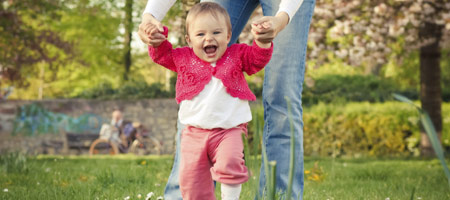Walking & Talking
These two milestones are baby's first strides towards being more independent.
Walking and talking are two things just about everyone takes for granted, but to you and your developing toddler, these milestones are huge accomplishments that should be celebrated.
These two milestones are incredibly important in your little one’s life and are their first strides towards being more independent.
Walking
The first year of your baby’s life will be chock full of exciting accomplishments as he or she gains muscle strength and coordination allowing them to roll over, sit, and then crawl. Between the ages of six and ten months he or she should be able to stand up by holding on to a sturdy surface.
Once the basics are mastered, your little one will improve balance as well as confidence. By the time the first birthday rolls around, most babies have taken their first steps. By the age of fifteen months most babies can walk without assistance, but may still be a bit unsteady. There is no need to worry if your baby walks a bit later than most. Some babies will not take their first steps until they are closer to eighteen months.
By the age of fifteen months most babies can walk without assistance
You can help to encourage your baby to walk by standing him or her up, holding on to both hands, and showing basic walking movements. Show your child how to get up and down by moving his or her legs.
Toys that can be held on to and pushed are another great way to provide support and confidence for those starting to walk. Baby walkers are not recommended, however, as they tend to tip over and cause injuries.
Keep your baby’s feet free and out of shoes until he or she has mastered basic walking skills. Shoes should only be put on when the child is walking outside in rugged, hot, or cold conditions. Bare feet help with coordination and balance, as well as straightening and proper growth.
Always make sure your child has a safe place to practice walking that has been child proofed and is free of hazards that could cause injuries from a fall. Never leave your child unattended in case he or she falls and needs assistance.
Talking
Your child learns language basics gradually over time by observing, hearing, feeling, seeing, and thinking. Well before the first words are spoken, your child has learned a great deal by watching others.
Babies learn communication from the first time they cry. In the early months, crying is the only way to express feelings and needs. By about three months of age, you may notice more babbling and cooing, especially when they are being spoken to. From about six months, certain sounds are becoming clearer, such as "da", or "ma"; this is because of the sounds being repeated often.
By eighteen months anywhere from six to twenty simple words may be used
Between the ages of twelve and seventeen months, you may notice that your child is now using one or two words to communicate, such as "dada" or "muma". These sounds are often accompanied by gestures, and even raising their voices to show excitement. Simple commands or instructions should be understood at this time as well. By eighteen months anywhere from six to twenty simple words may be used, and by twenty four months, as many as fifty single words may be used.
Enjoy the random chatter and interesting sounds you hear coming from your little one. Encourage speech by using proper names and terms, and showing your child what you are talking about. If you have concerns about your toddler’s language development, speak with his or her doctor. They will be able to evaluate your child and provide assistance if necessary.

